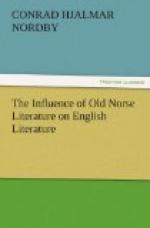As had already been intimated, the table of contents in a present-day volume of poetry is very apt to show an Old Norse title. Thus Robert Lord Lytton’s Poems Historical and Characteristic (London, 1877) reveals among the poems on European, Oriental, classic and mediaeval subjects, “The Death of Earl Hacon,” a strong piece inspired by an incident in Heimskringla. In Robert Buchanan’s multifarious versifying occurs this title: “Balder the Beautiful, A Song of Divine Death,” but only the title is Old Norse; nothing in the poem suggests that origin except a notion or two of the end of all things. “Hakon” is the title of a short virile piece more nearly of the Norse spirit. Sidney Dobell’s drama Balder has only the title to suggest the Icelandic, but Gerald Massey has the true ring in a number of lyrics, with themes drawn from the records of Norway’s relations with England. In “The Norseman” there is a trumpet strain that recalls the best of the border-ballads; there is also a truthfulness of portraiture that argues a poet’s, intuition in Gerald Massey, if not an acquaintance with the sagas:
The Norseman’s King
must stand up tall,
If he would be head over all;
Mainmast of Battle! when the
plain
Is miry-red with bloody rain!
And grip his weapon for the
fight,
Until his knuckles grin tooth-white,
The banner-staff he bears
is best
If double handful for the
rest:
When “follow
me” cries the Norseman.
He knows the gentler side of Old Norse character, too, a side which, as we have seen, was not suspected till Carlyle came:
He hides at heart of his rough
life,
A world of sweetness for the
Wife;
From his rude breast a Babe
may press
Soft milk of human tenderness,—
Make his eyes water, his heart
dance,
And sunrise in his countenance:
In merriest mood his ale he
quaffs
By firelight, and with jolly
heart laughs
The blithe, great-hearted
Norseman.
The poem “Old King Hake,” is as strikingly true in characterization as the preceding. In half a dozen strophes Massey has told a whole saga, and has found time, too, to describe “an iron hero of Norse mould.” How miserable a personage is the Italian that flits through Browning’s pages when contrasted with this hero:
When angry, out the blood
would start
With old King
Hake;
Not sneak in dark caves of
the heart,
Where curls the
snake,
And secret Murder’s
hiss is heard
Ere the deed be
done:
He wove no web of wile and
word;
He bore with none.
When sharp within its sheath
asleep
Lay his good sword,
He held it royal work to keep
His kingly word.
A man of valour, bloody and
wild,
In Viking need;
And yet of firelight feeling
mild
As honey-mead.




